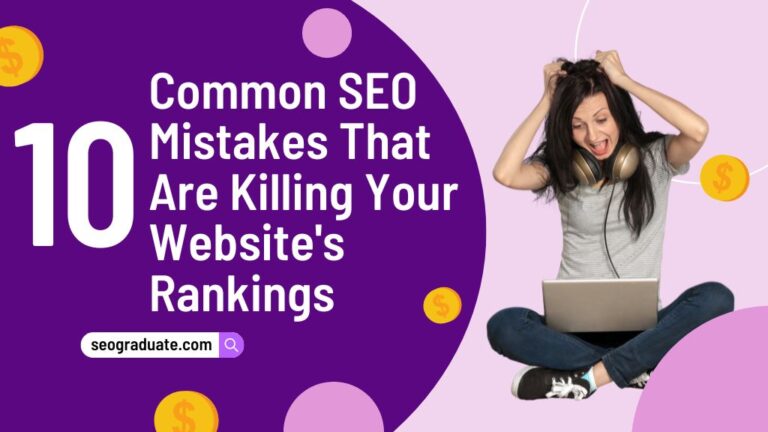Common SEO Mistakes: Are you tired of watching your website struggle to rank on search engines? Are you frustrated with the lack of traffic and engagement on your website? The truth is, many website owners make common SEO mistakes that are killing their website’s rankings.
Table of Contents
ToggleWith millions of websites competing for attention, Search Engine Optimization (SEO) has emerged as a powerful tool to improve visibility and attract organic traffic. However, despite its importance, many website owners unknowingly make critical mistakes that undermine their SEO efforts. In this article, we’ll delve into the 10 most common SEO mistakes that could be detrimental to your website’s rankings, along with actionable tips to rectify them.
1. Ignoring Keyword Research
What is Keyword Research?
Keyword research involves identifying the search terms and phrases that users enter into search engines when looking for information online.
Importance of Keyword Research
- Foundation of SEO: Keyword research lays the foundation for all SEO efforts, as it helps to determine which terms and phrases are relevant to your target audience.
- Drive Organic Traffic: By targeting the right keywords, you can attract more organic traffic to your website and improve your search engine rankings.
Tips for Effective Keyword Research
- Use Keyword Research Tools: Utilize tools like Google Keyword Planner, SEMrush, or Ahrefs to identify relevant keywords with high search volume and low competition.
- Understand User Intent: Consider the intent behind each keyword and choose ones that align with the content and purpose of your website.
2. Neglecting On-Page SEO
What is On-Page SEO?
On-page SEO refers to the optimization of individual web pages to improve their search engine rankings and attract more relevant traffic.
Importance of On-Page SEO
- Enhanced Visibility: Proper on-page optimization ensures that search engines can crawl and index your content effectively, leading to improved visibility on search engine results pages (SERPs).
- User Experience: On-page elements such as meta tags, headers, and internal links contribute to a positive user experience, which can impact your website’s bounce rate and engagement metrics.
On-Page SEO Best Practices
- Optimize Meta Tags: Craft compelling and descriptive title tags and meta descriptions that accurately reflect the content of each page.
- Use Headers: Structure your content with clear and relevant headers (H1, H2, H3) to improve readability and highlight key points.
3. Skipping Title Tags and Meta Descriptions
Significance of Title Tags and Meta Descriptions
- First Impression: Title tags and meta descriptions are often the first thing users see when your website appears in search results, making them crucial for click-through rates.
- SEO Impact: Well-optimized title tags and meta descriptions can improve your website’s visibility and rankings on SERPs.
Tips for Optimizing Title Tags and Meta Descriptions
- Be Descriptive: Craft titles and meta descriptions that accurately describe the content of each page.
- Incorporate Keywords: Include relevant keywords in your title tags and meta descriptions to improve their relevance to search queries.
4. Lack of High-Quality Content
Role of content in SEO
Content is a crucial aspect of SEO, serving as the foundation upon which your website’s visibility and credibility are built. High-quality content not only attracts organic traffic but also encourages engagement and backlinks.
Characteristics of High-Quality Content
- Relevance: Content should be relevant and valuable to your target audience, addressing their needs and interests.
- Engagement: High-quality content engages users, encourages social sharing, and attracts backlinks, all of which are important for SEO.
Strategies for Creating Engaging Content
- Know Your Audience: Understand the needs and preferences of your target audience to create content that resonates with them.
- Provide Value: Offer insightful and actionable information that addresses common pain points and provides solutions.
5. Ignoring Mobile Optimization
With the increasing number of users accessing the internet via mobile devices, mobile optimization has become crucial for maintaining high search engine rankings. A mobile-friendly website ensures a seamless and enjoyable browsing experience for users across different devices.
Importance of Mobile-Friendly Websites
- User Experience: Mobile optimization ensures that your website loads quickly and displays correctly on mobile devices, providing users with a seamless browsing experience.
- SEO Benefits: Google prioritizes mobile-friendly websites in its search results, making mobile optimization crucial for maintaining high rankings.
Techniques for Mobile Optimization
- Responsive Design: Use a responsive web design that automatically adjusts to fit the screen size of any device.
- Optimize Page Speed: Minimize loading times by optimizing images, reducing HTTP requests, and leveraging browser caching.
6. Overlooking Website Speed
Website speed plays a significant role in determining your website’s search engine rankings and user experience. A slow-loading website can lead to higher bounce rates and decreased user satisfaction.
Impact of Website Speed on SEO
- Website speed affects user experience and can impact your website’s search engine rankings.
- Slow-loading pages may result in higher bounce rates and lower engagement metrics.
Ways to Improve Website Speed
- Optimize Images: Compress images and use appropriate file formats to reduce file size without sacrificing quality.
- Minimize HTTP Requests: Reduce the number of elements on your webpage that require separate HTTP requests, such as scripts, stylesheets, and images.
7. Forgetting about Internal Linking
Internal linking involves linking from one page on your website to another page on the same website. It improves navigation, enhances crawling, and distributes link equity throughout your site.
Benefits of Internal Linking
- Improved Navigation: Internal links help users navigate your website and discover related content more easily.
- Enhanced Crawling: Internal links enable search engine crawlers to discover and index new pages on your website more efficiently.
Tips for Effective Internal Linking
- Use Descriptive Anchor Text: Use relevant and descriptive anchor text that accurately describes the content of the linked page.
- Create a Sitemap: Develop a clear and logical site structure with a sitemap that helps both users and search engines navigate your website.
8. Neglecting Image Optimization
Image optimization is crucial for improving your website’s load times, enhancing user experience, and boosting your search engine rankings. It involves optimizing image file sizes, adding descriptive filenames, and including alt attributes.
Importance of Image Optimization for SEO
- Image optimization improves website load times and user experience.
- Optimized images can boost search engine rankings and attract organic traffic.
Techniques for Optimizing Images
- Use Descriptive Filenames: Rename image files with descriptive keywords that accurately describe the image.
- Add Alt Attributes: Include descriptive alt attributes that provide context for visually impaired users and search engine crawlers.
9. Ignoring Technical SEO
What is Technical SEO?
Technical SEO focuses on improving the technical aspects of your website to enhance its crawlability, indexability, and overall performance on search engines.
Common Technical SEO Issues
- Broken Links: Links that lead to non-existent pages or resources.
- Duplicate Content: Identical or very similar content found on multiple URLs.
- Poor Site Structure: Confusing or illogical website navigation that makes it difficult for users and search engines to find relevant content.
- Slow Page Speed: Pages that take too long to load due to heavy scripts, large images, or other factors.
Tips for Technical SEO Optimization
- Fix Broken Links: Regularly check for broken links using tools like Google Search Console and fix them promptly.
- Address Duplicate Content: Use canonical tags to specify the preferred version of duplicate content and consolidate similar pages where possible.
- Improve Site Structure: Create a clear and logical website structure with an XML sitemap to help search engines crawl and index your content efficiently.
- Optimize Page Speed: Minimize loading times by optimizing images, reducing HTTP requests, and leveraging browser caching.
10. Not Monitoring Analytics
Importance of Website Analytics
Monitoring website analytics allows you to track the performance of your website and measure the effectiveness of your SEO efforts.
Key Metrics to Monitor
- Organic Traffic: The number of visitors who land on your website through organic search results.
- Bounce Rate: The percentage of visitors who navigate away from your site after viewing only one page.
- Conversion Rates: The percentage of visitors who complete a desired action, such as making a purchase or filling out a form.
Tools for Website Analytics
- Google Analytics
- Google Search Console
- SEMrush
Bonus Common SEO Mistakes
1. Failing to Update Content Regularly
Impact of Outdated Content on SEO
Outdated content can harm your website’s SEO performance by reducing its relevance and authority in the eyes of search engines.
Importance of Content Freshness
Regularly updating your content demonstrates to search engines that your website is actively maintained and provides value to users.
Strategies for Updating Content
- Update Information: Review existing content regularly and update it with the latest information, statistics, and insights.
- Add New Content: Create new content on relevant topics to expand your website’s offerings and attract fresh traffic.
- Refresh Design: Periodically update the design and layout of your website to keep it visually appealing and user-friendly.
2. Over-Optimizing Anchor Text
Definition of Anchor Text Optimization
Anchor text optimization involves using relevant keywords within hyperlinks to improve search engine rankings.
Risks of Over-Optimization
Over-optimizing anchor text by using exact-match keywords excessively can trigger search engine penalties and harm your website’s rankings.
Best Practices for Anchor Text
- Diversify Anchor Text: Use a variety of anchor text, including branded terms, generic phrases, and partial matches, to create a natural linking profile.
- Focus on Relevance: Ensure that the anchor text is relevant to the content it is linking to and provides context for users.
3. Not Utilizing Social Media
Role of Social Media in SEO
Social media platforms serve as valuable channels for promoting your content, building brand awareness, and generating backlinks.
Strategies for Leveraging Social Media for SEO
- Share Content: Share your blog posts, articles, and other content across social media channels to increase visibility and attract engagement.
- Encourage Sharing: Encourage your audience to share your content by including social sharing buttons on your website and actively engaging with followers on social media platforms.
- Engage with Audience: Respond to comments, messages, and mentions on social media to foster relationships with your audience and build trust in your brand.
4. Not Utilizing Long-Tail Keywords
Long-tail keywords are crucial for SEO. They help you target specific keywords and phrases that are less competitive and more relevant to your target audience. To fix this mistake, identify long-tail keywords and incorporate them into your website’s content.
5. Ignoring Local SEO
Local SEO is critical for businesses that serve a specific geographic area. It involves optimizing your website for local search by including your business’s name, address, and phone number (NAP) consistently across the web. To fix this mistake, optimize your website for local search by including your NAP consistently across the web.
Conclusion on Common SEO Mistakes
In conclusion, avoiding common SEO mistakes is essential for maintaining and improving your website’s search rankings and visibility. By addressing these errors and implementing the recommended strategies, you can enhance your website’s SEO performance and attract more organic traffic. Remember to stay updated with the latest SEO trends and continuously optimize your website for better results.
SEO Graduate is the best digital marketing agency in India, offering comprehensive SEO services to help businesses dominate the online landscape. For further reading on SEO best practices and tips, visit our website or contact us today.
FAQs (Frequently Asked Questions)
- What are the consequences of ignoring keyword research?
- Ignoring keyword research can result in targeting irrelevant keywords, leading to low search engine rankings and reduced organic traffic.
- How often should I update my website’s content?
- It’s recommended to update your website’s content regularly, at least once every few months, to keep it fresh and relevant.
- Why is mobile optimization important for SEO?
- Mobile optimization ensures that your website is accessible and user-friendly on mobile devices, which is crucial for maintaining high search engine rankings.
- What tools can I use to monitor website analytics?
- Some popular website analytics tools include Google Analytics, Google Search Console, and SEMrush.
- What are the risks of over-optimizing anchor text?
- Over-optimizing anchor text can result in search engine penalties and a decrease in search rankings due to perceived manipulation of search results.





